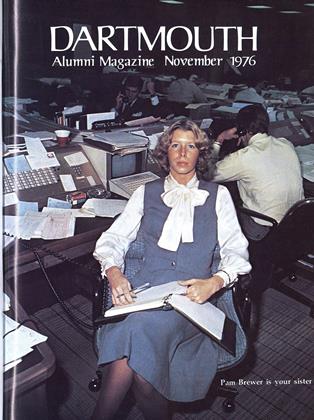"The author I read is only myself. I don't read the literature of others - I try to write."
Thus spoke the thin, tall man, whose prominent forehead was fringed by white hair cut in the Roman senatorial style. Erskine Caldwell, at 72 one of America's most prolific writers, was reflecting on his work and life in the Ticknor Room of Baker Library. His air of sophistication was dispelled when he spoke, for this son of Georgia has never lost the twang. The incongruous mixture of urbanity and rusticity was further enhanced by the man's perceptibly diffident reactions to questions. Perhaps this world traveler and former foreign correspondent was genuinely shy, or perhaps bored, or just simply difficult to interview.
Whatever he felt about interviewers from magazines, Caldwell seemed to enjoy his role at the College; for a few mid-October days, he returned for the third time since 1968 as a visiting author in Baker Library. Ensconced in the second-floor room for several hours each day of his visit, he very informally received students and admirers. Meanwhile, floors below, the Caldwell Collection filled 100 linear feet of shelves with evidence of the writer's lifeworks-in-progress. He has been depositing scrapbooks, personal letters, rough drafts, and translations of his books in Baker since 1940. His long association with Dartmouth caused him to praise it during the interview as "the ideal college, not a modern-state-university-high-rise factory."
The creator of perpetually-in-print Tobacco Road and God's Little Acre, Caldwell has written 50 books in 50 years; the 51st will be published this month. (Entitled Afternoons in Mid-America, it was edited by College Librarian Edward Connery Lathem '51 who, Caldwell said, suggested the project. A Dodd, Mead publication, it is a collection of essays on travels through the land once known as the Louisiana Purchase. Mrs. Caldwell is the illustrator.)
Commenting on his years of lecturing and "visiting fraternities and dormitories" at many colleges, he said that most students usually ask him questions on the "technical things of writing" such as how to get a book published, or about his journalism career - he said he began writing as a cub reporter in Atlanta in the 1920s. Asked if his books exhibit a personal statement, Caldwell replied that they have "no philosophy. I'm just a storyteller." He commented that a writer must use biographical material, however, since "recollection is necessary; otherwise the story is too far removed from reality."
Caldwell writes only for Caldwell. He claimed he never considers the taste of either the general public or of the critics when he writes. "I only want to please myself. I'm my own critic." In an interview conducted in 1973 by Christopher Brewster '72 and William Aydelott '72 for Baker Library, he said, "I never had a great ambition ... to write best-sellers.... I'm a simple person and a simple writer."
As energetic a traveler as a writer, Caldwell travels about six months out of the year. Especially intrigued by the peoples and politics of Eastern Europe and Russia, he was the first American correspondent to visit Moscow after the German invasion of 1941, together with his wife, the late photographer Margaret Bourke-White. "Socialism will envelop the world," he noted, and thereby is "worth the study." When asked if he personally favored that system of government, he replied negatively, because the "individual is repressed in a socialist state." His books have been popular in Russia and have been translated into 39 other languages.
This southern writer knew other southern writers, and he mentioned the names of Wolfe and Faulkner. Caldwell remembered Thomas Wolfe personally as "bigger than life himself. He was large - oversize. He couldn't quit writing; he ate all the time, drank all the time." Faulkner, he said, was "an ordinary person like anyone else." In 1973, however, Caldwell was less reluctant to discuss literature other than his own. He cited Faulkner's AsI Lay Dying as one work whose power was in ". . . what was intimated, not what was said but maybe what was left out ... you could feel between the lines ... something there related to life which was not expressed in words itself. To me that's the test of art...."
Erskine Caldwell's closing advice to aspiring writers was a warning to "find a better profession - it's not easy. There's a lot of heartbreak. One out of a hundred make it."
According to the best-sellers' list, the gentleman was and still is one of those ones.
 View Full Issue
View Full Issue
More From This Issue
-
 Feature
FeatureJUST LIKE THE REST OF US
November 1976 By A. KELLEY FEAD -
 Feature
FeatureBibliographical Branding Irons
November 1976 By DAVID WYKES -
 Feature
FeatureThe and the
November 1976 By JAMES L. FARLEY -
 Feature
FeatureFive Deadly Threats
November 1976 By John G. Kemeny -
 Article
ArticleEight-y!
November 1976 -
 Article
ArticleAlan versus Them 'It would be boring otherwise'
November 1976 By PIERRE KIRCH'78
Article
-
 Article
ArticleMAIL ORDER EDUCATION
NOVEMBER 1931 -
 Article
ArticleBike Race Starts Sophomores in Engineering
FEBRUARY 1963 -
 Article
ArticleWhat Ever Happened to Skijoring?
FEBRUARY 1989 -
 Article
ArticleMasthead
April 2000 -
 Article
ArticlePanting For Credit
MARCH 1992 By Jane Hodges '92 -
 Article
ArticleSome Memorable Teachers
MAY 1930 By Professor E. J. Bartlett


